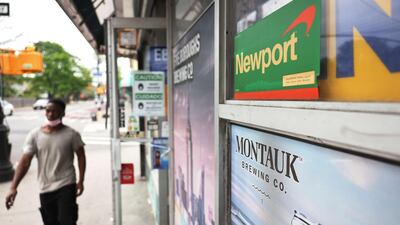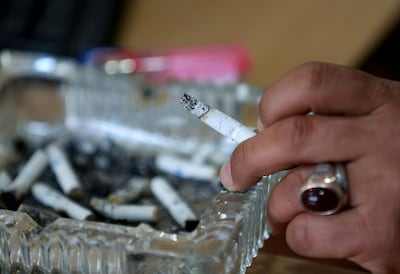Outside a 7-Eleven in downtown Washington, DC, a middle-aged man sits on the edge of a flower bed, a menthol cigarette loosely dangling from his right hand.
"I've been smoking since my early teens, probably 12 or 13," said Tracey, who gave only his first name.
Tracey, like the vast majority of black smokers in the US, prefers menthol cigarettes. But under new rules proposed by the Food and Drug Administration (FDA), menthol sales could be banned in the US. The proposal is in response to a citizen's petition.
Tracey said any such ban would have little effect on him and he would just switch to a different type of cigarette, but tobacco industry watchers say the proposed rules could affect the market.
About 13.7 per cent, or nearly 34.2 million, of the US population smoked cigarettes in 2018, according to the Centres for Disease Control and Prevention (CDC).
In the same year, tobacco companies spent $9.06 billion marketing cigarettes and smokeless tobacco in the US, equivalent to about $25 million a day, or more than $1m every hour, according to the CDC.
Shares in British American Tobacco, which produces the menthol brand Newport, fell more than 2 per cent after the FDA announcement. Altria, which makes Marlboro Menthol and Imperial, which is behind Kool, slid 1 per cent.
The proposed ban "could create a massive blow to the future sales of the tobacco industry", said Kanupriya Rohilla, a senior consultant at Imarc Group. The ban could decrease future sales of cigarettes by as much as 40 per cent, she said.
Goldman Sachs said uncertainty from increased regulation could pressure tobacco investors "with exposure to the US market, given the importance of menthol".
However, the investment bank said any ban would probably take years to implement, ultimately leading to "minimal negative impact on the total nicotine pool".
Menthol cigarettes, which make up about a third of tobacco sales in the US, create a cooling sensation that masks the harshness of inhaling smoke.
Anti-tobacco groups say banning the cigarettes could have a significant impact on the health of African Americans. According to the FDA, out of all black smokers, nearly 85 per cent smoke menthols, compared with 30 per cent of white smokers. African American men have the highest rate of lung cancer in the US, according to the CDC.
Tobacco companies have for years aggressively marketed menthols to young people and African Americans in urban areas, the CDC said.
The agency has been calling for the ban for decades.
"The victory in terms of banning menthol, in addition to saving lives, it also gives us a ray of hope," Delmonte Jefferson, the executive director of the Centre for Black Health and Equity, told The National.
According to the CDC, more than half of young people who smoke now use menthols.
"It's about time we prioritise the health and well-being of African Americans," the National Association for the Advancement of Coloured People said in reaction to the announcement.
The CDC said tobacco companies target menthol cigarette marketing to people who are new to smoking, mostly young people, using themes and images that appeal to these groups, "like popularity, being accepted by people in their age group and positive self-image".
The move to ban menthol cigarettes was welcomed by the Campaign for Tobacco-Free Kids.
“The administration’s new policy has the potential to be the strongest action our nation has ever taken to drive down the number of kids who start smoking and the number of Americans who are sickened and killed by tobacco,” said Matthew Meyers, the director of the Campaign for Tobacco-Free Kids.
While there is widespread support for the ban among health officials, some organisations worry that it could impact civil liberties and disproportionately affect African Americans.
“It is now clear that policies that amount to prohibition have serious racial justice implications,” said Aamra Ahmad, senior legislative counsel for the American Civil Liberties Union.
"Time and time again, we see encounters with police over minor offences – for Daunte Wright it was expired tags, for George Floyd it was using a counterfeit bill, for Eric Garner it was selling loose cigarettes – result in a killing."
Some analysts believe a ban on menthols will lead to a black market for the products.
"If you prohibited menthol cigarettes, there will be another large illicit market, which criminal enterprises will seek to satisfy," Guy Bentley, director of consumer freedom research at Reason Foundation, a libertarian think tank, told The National.
Similar bans have already taken effect in Canada and the EU.
In Canada, the ban had a positive impact and influenced some smokers to quit, according to new research from the International Tobacco Control Policy Evaluation Project at the University of Waterloo.



